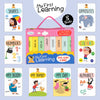Introduction: Why Sports Matter for Kids
Sports play a vital role in a child's overall development, shaping not just their physical health but also their mental and emotional well-being. Engaging in sports helps children develop essential life skills, stay active, and build confidence. Whether it's cricket, football, badminton, swimming, athletics, basketball, hockey, or martial arts, sports provide a structured way for kids to learn teamwork, discipline, and perseverance while having fun. In this blog, we explore the numerous benefits of youth sports and why they should be an essential part of every child's life.
1. Physical Health and Fitness
-
Regular participation in sports helps kids maintain a healthy weight, improve stamina, and develop strong muscles and bones.
-
It reduces the risk of obesity, heart disease, and diabetes later in life.
-
Playing sports enhances motor skills, coordination, and flexibility, making kids more agile and active.
2. Mental and Emotional Well-being
-
Sports encourage stress relief and help children manage anxiety and frustration in a healthy way.
-
The release of endorphins (feel-good hormones) during physical activity boosts mood and enhances focus.
-
Kids develop resilience and patience, learning how to handle wins and losses gracefully.
3. Boosts Social Skills and Teamwork
-
Sports teach kids the value of collaboration and teamwork, helping them build friendships and work with others toward a common goal.
-
Playing in a team fosters communication skills, leadership qualities, and cooperation.
-
Children learn how to handle constructive criticism, develop sportsmanship, and respect their opponents.
4. Builds Confidence and Self-Esteem
-
Scoring a goal in football, winning a race in athletics, or simply improving in badminton gives kids a sense of achievement and confidence.
-
They learn to set goals, work towards them, and celebrate progress.
-
Encouragement from coaches, teammates, and parents boosts their self-belief and determination.
5. Encourages Discipline and Time Management
-
Balancing academics and sports teaches kids time management and prioritization.
-
Following game rules and adhering to practice schedules instills discipline and commitment.
-
They learn the importance of hard work and consistency to achieve success.
6. Cognitive and Academic Benefits
-
Studies show that children involved in sports perform better in academics due to improved concentration and problem-solving skills.
-
Sports enhance decision-making abilities, quick thinking, and strategy development.
-
Kids develop a growth mindset, understanding that effort leads to improvement in all areas of life.
7. Encourages a Healthy Lifestyle
-
Active children are more likely to continue leading a healthy lifestyle into adulthood.
-
They develop habits of regular exercise, healthy eating, and overall well-being.
-
Being involved in sports reduces screen time and promotes outdoor activities.
8. Reduces Risk of Behavioral Issues
-
Engaging in sports helps kids channel their energy positively, reducing aggression and hyperactivity.
-
It keeps them engaged in productive activities, reducing the likelihood of unhealthy habits.
-
Participation in team sports fosters a sense of belonging, reducing feelings of isolation or loneliness.
9. Exposure to Leadership Opportunities
-
Sports allow kids to take on leadership roles, whether as a team captain, mentor, or motivator.
-
They learn responsibility by guiding their teammates and setting examples.
-
These skills translate into future success in academics, careers, and social settings.
10. Instills a Never-Give-Up Attitude
-
Sports teach kids to embrace failure and setbacks as learning opportunities.
-
They develop perseverance and grit, understanding that success requires effort.
-
This mindset benefits them in all aspects of life, from academics to future careers.
Popular Sports for Kids and Their Benefits
-
Cricket – Enhances reflexes, hand-eye coordination, and teamwork.
-
Football – Improves endurance, agility, and quick decision-making.
-
Badminton – Boosts reaction time, coordination, and cardiovascular health.
-
Swimming – Develops full-body strength, stamina, and breathing control.
-
Basketball – Encourages teamwork, speed, and strategic thinking.
-
Martial Arts – Instills discipline, self-defense skills, and mental resilience.
-
Hockey – Enhances coordination, agility, and endurance.
-
Athletics (Running, Jumping, Throwing) – Improves speed, strength, and overall fitness.
-
Cycling – Strengthens leg muscles and promotes cardiovascular health.
-
Tennis – Enhances concentration, balance, and endurance.
Encouraging kids to explore different sports will help them find the one they love the most and stay engaged in physical activities!
Conclusion: Encouraging Kids to Play Sports for a Brighter Future
Sports are more than just games; they are a foundation for lifelong learning, fitness, and character development. Encouraging kids to participate in sports not only boosts their health but also prepares them for real-world challenges. Parents and educators should support and promote sports activities, ensuring children develop into well-rounded individuals with a passion for staying active.
📌 Tip: Let kids explore different sports to find what they enjoy the most—whether it's football, tennis, swimming, or cricket. The key is to keep them moving and engaged in a way that builds skills, confidence, and a love for an active lifestyle!








